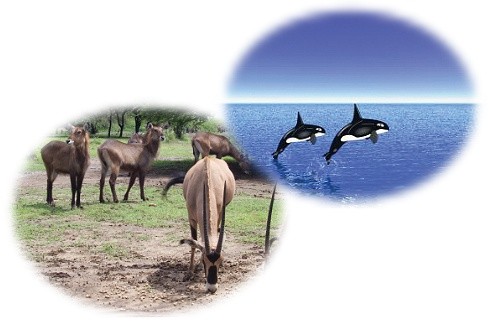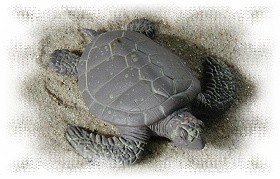|
Positive Improvements on the Planet |
| Animal Rights on Earth |
| Compiled from Supreme Master Television News |
Many countries around the world have developed compassionate animal acts to protect the lives of the innocent animals on earth, including animals dwelling in the blue oceans. More and more bright, virtuous and compassionate leaders and people are working in the same direction, dedicated to improving the welfare of animals.
One of the United States’ most comprehensive plans to protect marine life has been approved. A state panel voted to ban or place restrictions on fishing across more than 200 square miles of water off Central California. Thirteen of the twenty-nine marine preserves that were unanimously designated by the Fish and Game Commission will be off-limits to all commercial and recreational anglers. Deep water fishing will be prohibited in the remaining 16 areas. Commissioners and environmentalists commend this action as a landmark for ocean conservation. (Episode 217)
The World Conservation Union is trying to safeguard our beautiful blue oceans! A new guide for establishing marine protected area networks has been outlined by the World Conservation Union. At its Marine Protected Area Summit held in April, Golden Year 4 (2007), in Washington, DC, 50 marine experts and conservationists have come together to plan the increase of protected marine areas. Dan Laffoley, marine vice chair of the World Commission on Protected Areas said, “Our oceans play a fundamental role in shaping and regulating our climate.” (Episode 233)
South Pacific nations have agreed to stop bottom trawling to protect marine lives. A landmark agreement signed in Chile will protect one quarter of the world’s oceans. Bottom trawling, a practice used by fishing boats, will be prohibited in areas with “vulnerable marine ecosystems.” Monitoring systems will be set up to ensure compliance with the new regulations. Matthew Gianni, a spokesperson for the Deep Sea Conservation Coalition, welcomed the moves, and said, “This is a major step forward in the protection of biodiversity on the high seas.” (Episode 236)
The Swedish government has made a significant contribution to ocean environment conservation! The government allocated 500 million kronor or US$71 million for a 3-year marine conservation project. The Environment Minister Andreas Carlgren and Swedish European Union affairs minister, Cecilia Malmstrom, indicated this budget will particularly help restore the Baltic and North Sea environments.
Various projects will be initiated, including oxygenating the seabed and re-establishing the natural marine migration paths of various fish species. Sweden will also look to collaborate with other Baltic Sea states and the European Union to preserve these marine environments. (Episode 241)

The British government will publish a brochure designed to encourage nations opposed to whaling to join the Commission. The brochure calls whales “sensitive, social creatures” and states that the protection and saving of whales is a “global responsibility.” British Prime Minister Tony Blair is advocating anti-whaling, saying, “We urge your government to join the UK and the other anti-whaling nations in the International Whaling Commission to ensure that our generation meets its responsibility to protect whales.” (Episode 165)
In wildlife conservation news, five countries in Southern Africa are planning a cross border wildlife conservation area. This initiative would greatly benefit Africa’s largest elephant herd. Environmental ministers from five southern African countries plan to develop a 111,000 square-mile (or 288,000 square-kilometer) part of Africa into an open-border, free-roaming conservation zone. The increased roaming space would benefit an estimated 150,000 elephants. (Episode 227)
 The
National Anti-Vivisection Society (NAVS) and Animal Defenders International
(ADI) are celebrating the news that Ireland could become the first
European country in the world to ban laboratory experiments on monkeys.
This progress has been made after a long-running campaign in the European
Union. (Episode 195)
The
National Anti-Vivisection Society (NAVS) and Animal Defenders International
(ADI) are celebrating the news that Ireland could become the first
European country in the world to ban laboratory experiments on monkeys.
This progress has been made after a long-running campaign in the European
Union. (Episode 195)
European scientists have recently announced that most experiments currently carried out on live animals are now able to be done in a humane fashion. This finding will save the lives of 20,000 rabbits per year and 240,000 mice. European scientists have eliminated the need to use rabbits and mice to test cosmetics and dishwashing liquid. Scientists announced that the new tests are more reliable for checking the safety of chemicals in makeup and other products. A complete ban on animal testing for cosmetics will go into effect in Golden Year 6 (2009). (Episode 237)
In the United States, many people and organizations are working together to promote animal rights. On April 10, Golden Year 4 (2007), the Animal Fighting Prohibition Enforcement Act was passed by the United States Senate. The unanimous decision came in the wake of the bill being passed by the House of Representatives. This triumphant moment for the Humane Society and countless animals has come after six years of campaigning. The legislation, now to be signed by President Bush and immediately enacted, will deter animal fighting through meaningful federal penalties. (Episode 235)
In UK, the Animal Welfare Act is implemented in Wales. The Animal Welfare Act will ensure that all pets will be provided with basic welfare needs including fresh water, suitable living conditions, protection from injury, and the ability to express normal behavior. This is cause for celebration for the Royal Society for the Prevention of Cruelty to Animals (RSPCA), which has long anticipated the new legislation. (Episode 203)
The American Red Cross Society in Texas, USA, recently held a first aid course that instructs pet guardians on how to deal with pets in crisis situations. Guardians learn life-saving tips, including how to help an animal that is having difficulty breathing, how to carry an injured pet, and how to perform cardiopulmonary resuscitation (CPR). (Episode 208)
Doctors and nurses, more than ever, treat the animals as caringly as they do human beings. In Chicago, USA, a team of medical experts removed a cancerous growth from the right eyelid of a 300 pound bear. In Germany, in the first ever operation of its kind, a medical team completed an ultrasound eye surgery on a baby rhinoceros to heal its blindness from birth due to cataracts. (Episode 234 and 238)
 Biologist
Donna Shaver has dedicated more than 20 years of her life to saving
one of the most endangered species in the world, Kemp’s Ridley
sea turtle. According to the National Park Service, Dr. Shaver is
the foremost expert in the United States on endangered Kemp’s
Ridley sea turtles and a leader in sea turtle biology and recovery.
Records indicate that because of Dr. Shaver’s efforts, more
than 24,000 Kemp’s Ridley turtles have hatched safely and made
their way to their home in the sea. (Episode 236)
Biologist
Donna Shaver has dedicated more than 20 years of her life to saving
one of the most endangered species in the world, Kemp’s Ridley
sea turtle. According to the National Park Service, Dr. Shaver is
the foremost expert in the United States on endangered Kemp’s
Ridley sea turtles and a leader in sea turtle biology and recovery.
Records indicate that because of Dr. Shaver’s efforts, more
than 24,000 Kemp’s Ridley turtles have hatched safely and made
their way to their home in the sea. (Episode 236)
We are happy to see that more and more
people are taking steps to protect animals, our co-inhabitants on Earth,
including aquatic beings. More and more attention is also paid to reduce
the amount of ocean pollution, including oil contamination and plastic
marine debris, which are responsible for injuring or killing numerous
marine animals. We are grateful for all these efforts from governments,
environmental protection organizations and individuals. ![]()
| << | Contents | >> |
|
Refer this page to friends
|
||